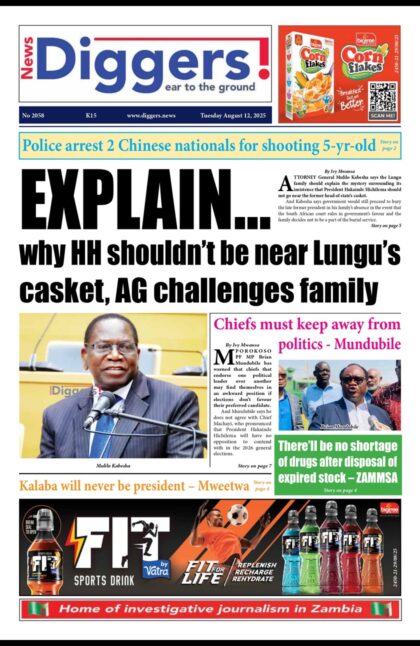GOVERNANCE activist Brebnar Changala has expressed fear that the prison vote will be abused in favour of the ruling party.
In an interview, Changala said the vote from the prisons could be a deciding factor in case of a re-run.
“In a nutshell, our fear is that the prison vote will be abused by the ruling party. As you might know, the prisoners are not less than 30,000 throughout the country and the last election, the presidency was decided by 13,000 votes. So when we want to go for a re-run, it means the prisoners Constituency will make decision and a decision in favour of the ruling party. The prisons chief, the commissioner, had made it abundantly clear, not in private but publicly in Monze, that those who do not support the current regime, the current government, the current President, will not be allowed to canvas a vote. In other words, he was trying to interpret that the prisons vote is basically meant for the ruling party,” Changala said.
Changala said the ruling party would have an unfair advantage during campaigns in prisons because they could make more attractive promises than the opposition.
“Prisoners vote is essential when it comes to people’s rights to participate in the governance of their country but however, that vote must be credible, that vote must be verifiable. The situation we face today is that all institutions of governance have collapsed hence the credibility of most of the operations are questionable. The prisoners vote is extremely suspicious in our current environment and situation,” he said.
“Where the prisoners vote is compromised is on the premise that an incarcerated person cannot negotiate freely, neither can an incarcerated person be free to make an independent choice in that the ruling government, the ruling party as it were, will go to prison and make only direct promises that ‘if you vote for us, we shall release you, you will be freed, the opposition cannot free you, we are the only people who can free you’.”
Changala wondered whether the opposition would be allowed to campaign freely in the prisons.
“The second challenge is the modus operandi, how will other interested political parties enter the prison cantonment, to campaign and canvas for votes and make promises that the prisoners will evaluate as to whether to retain government or indeed effect change? We have not been told of how and when will people alternate to go into prisons. I am speaking from a point of disappointment, we have a public order act outside which basically imprisons the entire nation and leaves it at the behest and benevolence of the ruling party and the state police. It’s difficult for people who are outside or political parties to assemble and communicate and campaign, how will it be then so easy to go in the prison and campaign if they cannot exercise that right outside without the interference from the state police. All these things tells you one thing, that we must wait a bit until we find a formula that will encourage a prisoner to freely choose a candidate of their choice,” said Changala.
“In any case, the prisoner in Mukobeko, how does he vote for a councillor? How does he vote for an MP? He might vote for the Republican President but these other lower organs are meant to serve the interest of their locality. The prisoner sent to the maximum prison at Mukobeko comes from Chipata, comes from Lundazi, comes from Kalabo and yet they are allowed to vote and vote for who? So there are many questions that begs answers in relation to that vote.”
























